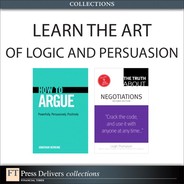Truth 18. Be aware of the “even-split” ploy
The following interchange actually occurred. What, if anything, is wrong with this picture?
Party A: I’ll offer you $15M to buy your company.
Party B: Are you kidding? It’s worth much more than that, and I have several offers. I would want at least $47M.
Party A: That’s a lot more than I’d ever want to spend. The most I could offer would be $18M.
Party B: Well, then we probably won’t reach a deal, because the company is worth $47M. But I might agree to $46M.
Party A: Still unacceptable. My highest bid would be $22M. But that would have to be with a closing in the next 30 days.
Party B: I don’t think I could accept that offer. I’m not trying to drive a hard bargain, but I think we both realize this company is special. I would agree to $45M.
Party A: My final offer is $25M.
Party B: Okay, I have an idea. Why don’t we just split the difference, for an even $35M? That would be fair to both of us.
Party A: That sounds fair, I guess.
Upon first glance, three things jump out about this negotiation.
It’s almost inevitable that one negotiator will suggest “splitting the difference.”
First, the party’s opening offers of $15M and $47M are wildly apart. There is a divide of $32M. That’s not atypical.
Second, both parties make concessions in a somewhat quid pro quo fashion. That’s advisable, per the previous Truth. However, I would encourage Party A to invite another concession from Party B because Party A made three concessions, while Party B made two concessions.
However, the real problem for Party A is not the number of concessions she made, but the magnitude of those concessions. Party A made concessions of a depth of $10M (initial offer of $15M, and most recent offer of $25M). In contrast, Party B made concessions one-fifth of that depth, or $2M (initial starting offer of $47M and most recent offer of $45M). Party A will probably never recover from this blunder.
It’s almost inevitable that one negotiator will suggest “splitting the difference” to close the gap. The emotional appeal of this ploy is overwhelming for most fair-minded negotiators, to the point that it seems selfish and egotistical to refuse. The problem in the previous negotiation is that Party A made much deeper concessions than Party B. Yet when Party B suggests splitting the difference, it’s as if the past never occurred.
In our rush to wrap up negotiations and show good faith, we often make concessions that are too steep and quick.
This is why I strongly caution negotiators to carefully plan their concessions. In our rush to wrap up negotiations and show good faith, we often make concessions that are too steep and quick.
